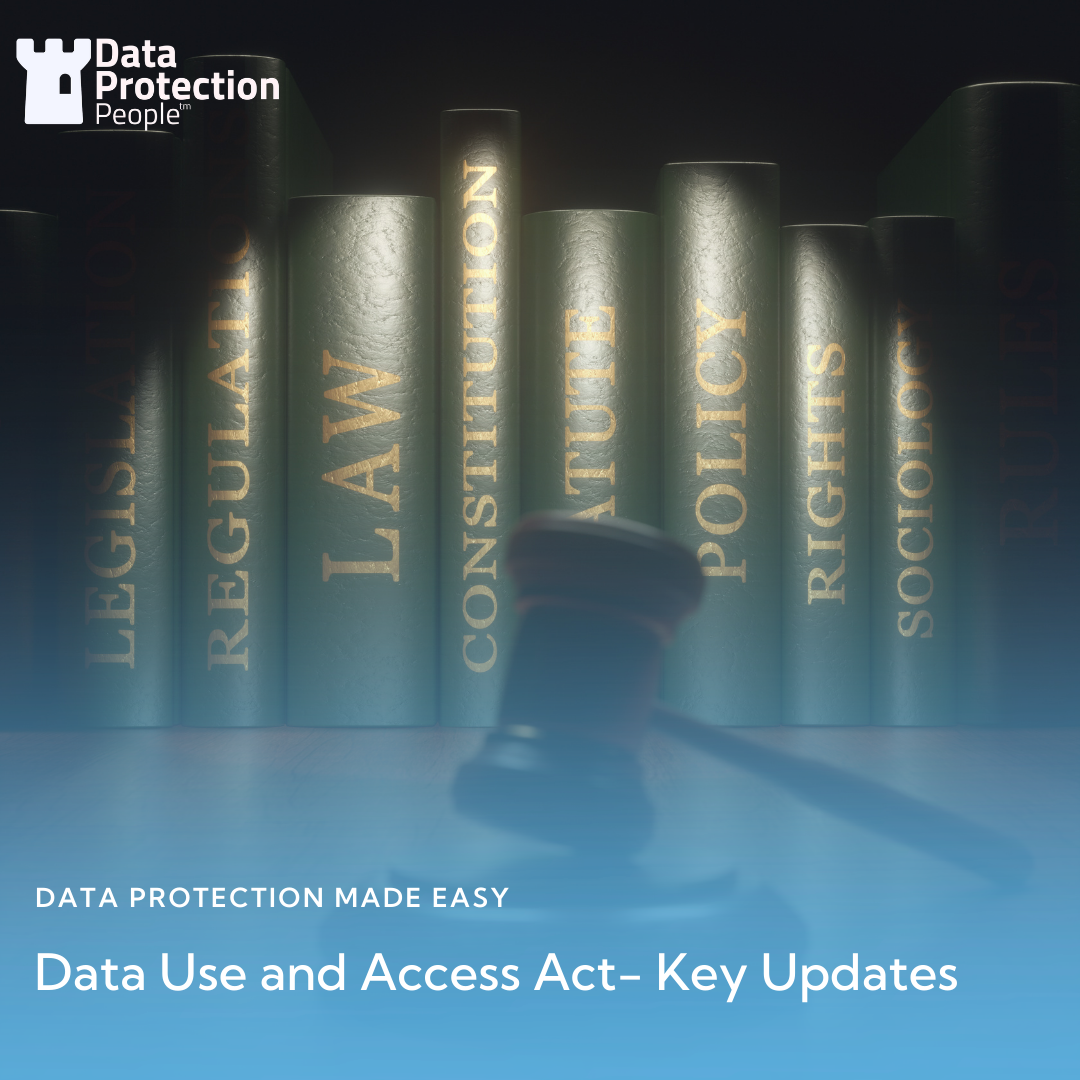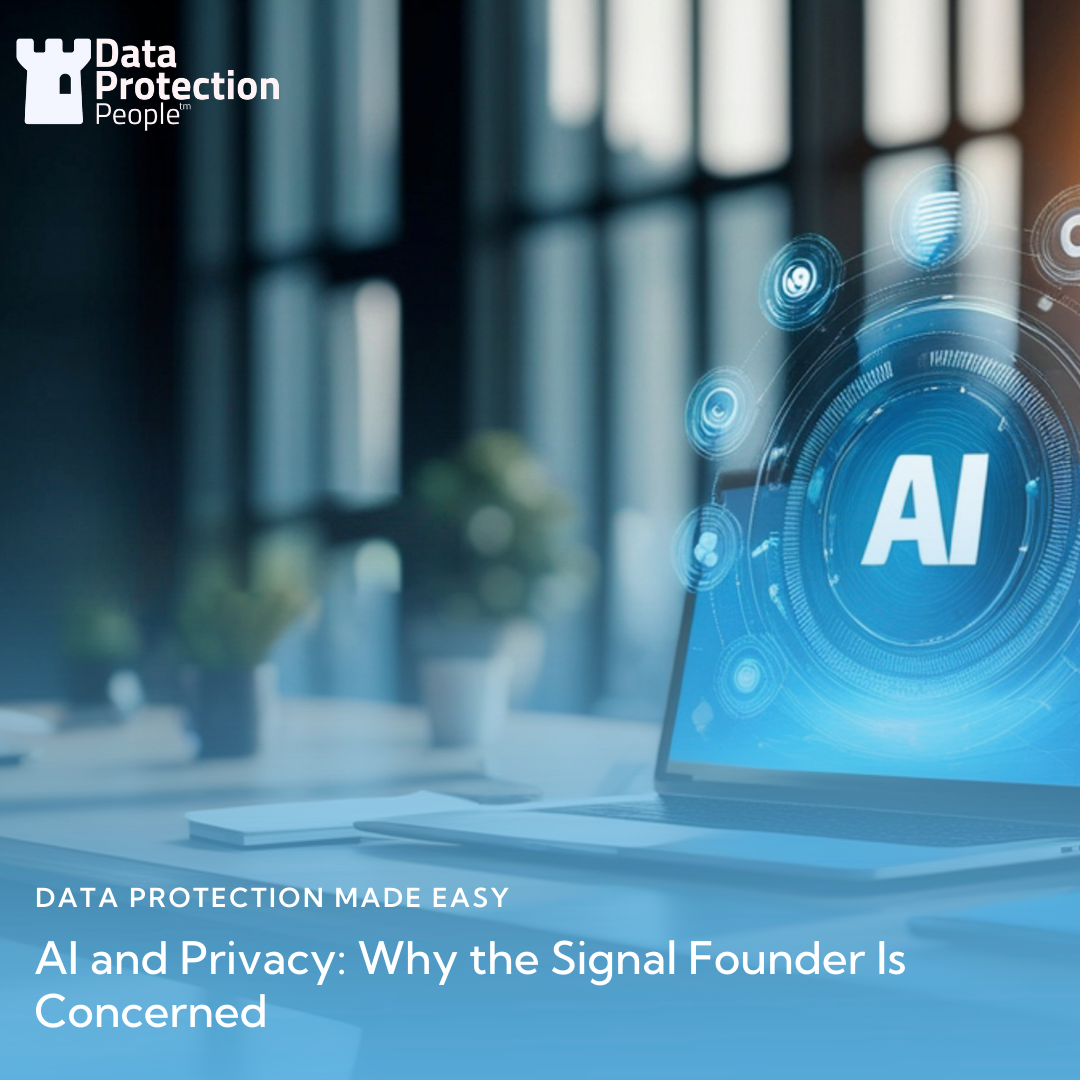Resources
Podcasts, Guides, Updates & More

Join our extensive list of clients who have their data privacy under control
Data Protection People Blogs
Data Privacy Learning & Guidance
Our mission is to make data protection easy: easy to understand and easy to do. Our weekly podcasts are available in our Resource Centre along with a collection of articles, white papers, useful guidance, templates, case law, and opinions – providing you with tools you can utilise in your workplace.
How To Choose The Right GDPR Training Course For Your Business
Ensuring your business is GDPR compliant begins with training, but GDPR training isn’t a one-size-fits-all approach. The right GDPR training course depends on your staff’s roles and the type of personal data they handle.
In this article, we’ll help you understand what GDPR training your employees need to stay compliant and protect your customers’ data.
Why GDPR Training is Important
Under GDPR, the ICO expects organisations to provide training that is “relevant, accurate and up to date” for all staff members. GDPR training isn’t limited to Data Protection Officers (DPO), HR or IT teams, it should apply to all employees who handle personal data. Effective GDPR training helps reduce the risk of data breaches, ensures personal data is processed correctly and supports overall compliance.
Article 39 of the GDPR states that a DPO is responsible for monitoring compliance, which includes overseeing staff data training. When the ICO investigates a data breach or reviews a complaint, they will often request evidence that all employees have received adequate GDPR training. Failure to provide adequate data training can lead to fines, legal action and reputational damage.
Who Needs GDPR Training?
Anyone in your organisation who processes or has access to personal data requires GDPR compliance training. This includes sensitive data about customers, employees, suppliers or other third parties. Consider a simple rule: if someone can access personal data, they need training.
While every department and employee in your business will handle data differently, everyone needs to understand their responsibilities under GDPR.
- Marketing teams use customer data and analytics for targeted messages and must understand GDPR consent requirements.
- Sales teams handle prospect and client data, so they must ensure they have permission to make contact and know how to comply with data erasure requests.
- IT teams must ensure appropriate security measures and access controls are in place to protect personal data.
- Finance teams process confidential employee, customer and supplier data and must handle it securely.
- HR teams manage staff records and sensitive personal information that must comply with GDPR requirements around confidentiality and data retention.
- Customer service teams regularly access and handle customer details and must ensure data is protected at all times.
Roles that have access to more sensitive data types and have increased responsibility for compliance, such as finance and IT teams, will require more specialised training than others.
Choosing The Right GDPR Training Course
GDPR training should be delivered during an employee’s induction and refreshed annually to maintain awareness and stay up to date with policy and legislative changes. The ideal course should be comprehensive, covering core principles of GDPR, data subject rights, data protection policies, protocols for data breaches and data security measures.
General GDPR training can be delivered company-wide, but role-specific training should be provided for different departments based on how they handle data. For example, customer service teams need training on security protocols for handling phone calls, while marketing teams require additional training on the Privacy and Electronic Communications Regulations (PECR) to ensure communications are sent lawfully and with consent.
GDPR Training From The Experts
As leading experts in data protection support, we offer a range of online and in-person GDPR training services to address your business requirements.
From awareness programmes that cover the fundamentals of data protection to bespoke training courses focusing on specific risks and roles, we have a solution for you. Additionally, our soon to launch data protection eLearning platform is packed with comprehensive online courses if you prefer a more flexible option.
Speak to our team today to learn more about our data protection training services.
Updated ICO guidance on DSARS
Updated ICO guidance on Data Subject Access Requests, what organisations need to know in 2026
The Information Commissioner’s Office (ICO) has published updated guidance on handling Data Subject Access Requests (DSARs). The update reflects changes introduced by the Data (Use and Access) Act 2025, alongside recent case law that clarifies how these changes should operate in practice.
While the right of access remains a fundamental data protection right, DSARs can be challenging to manage. Requests are often broad, unclear, repeated, or involve large volumes of data held across multiple systems. The updated guidance aims to help organisations handle these requests more consistently, while continuing to recognise the importance of transparency and accountability.
Understanding DSARs and the right of access
The right of access allows individuals to obtain confirmation as to whether their personal data is being processed and to receive a copy of that data, together with supplementary information about how and why it is processed.
This right sits at the core of UK data protection law and plays a critical role in enabling transparency, fairness, and accountability in how organisations handle personal data.
Key changes introduced by the Data Use and Access Act and ICO guidance
Stopping the clock where clarification is reasonably required
The updated guidance confirms that organisations may pause the one month response deadline where clarification is reasonably required to provide an effective response to a DSAR.
Importantly, the previous requirement that the organisation must be processing a large volume of personal data has been removed. Organisations may now seek clarification whenever it is genuinely necessary to understand the scope of a request.
The clock pauses only until sufficient clarification is received and resumes immediately afterwards. Organisations must still act without undue delay and should not use clarification requests to extend deadlines unnecessarily. Decisions to seek clarification should be documented clearly.
Increased transparency when refusing a DSAR
Individuals now have an explicit right to complain directly to the organisation if they believe their DSAR has not been handled in line with UK data protection law.
Where a DSAR is refused, organisations must inform the individual of the reason for refusal, their right to complain to the organisation, their right to complain to the ICO, and their right to seek a judicial remedy.
This change requires organisations to review refusal templates, ensure internal complaint processes are accessible, and respond to complaints without undue delay.
Reasonable and proportionate search assessments
The guidance reinforces that organisations are required to carry out reasonable and proportionate searches, rather than exhaustive searches in all circumstances.
When assessing proportionality, organisations should consider factors such as the volume of data involved, how information is stored and retrieved, technical or practical limitations, and the context of the request. These decisions should be documented so they can be justified if challenged.
Manifestly unfounded or excessive requests
Providing personal data in a commonly used electronic format, such as via a secure portal, will generally satisfy the obligation to provide a copy, unless the individual objects.
However, the ICO recognises that repeated requests for the same information in different formats, after it has already been provided, may be treated as manifestly unfounded or excessive. Any such assessment must be fact specific, narrowly applied, and clearly documented.
Disclosing identities of recipients
One of the most significant clarifications relates to the disclosure of recipients of personal data. The ICO states that organisations should disclose specific recipients by default.
Providing only categories of recipients should be the exception, permitted only where it is impossible to identify specific recipients or where disclosure would adversely affect the rights or freedoms of another person. Where categories are used, organisations must document their justification and any exemption relied upon.
Use of exemptions in supplementary information
The guidance confirms that exemptions may apply not only to the personal data disclosed, but also to supplementary information provided in response to a DSAR.
Where an exemption is relied upon, organisations should identify the specific exemption, document the balancing exercise undertaken, and record why disclosure would adversely affect the rights or freedoms of another individual.
What the courts have said
Harrison v Cameron
In Harrison v Cameron, the court confirmed that the right of access generally includes a right to know who personal data has been disclosed to. Reliance on categories of recipients alone requires justification, and organisations must be able to explain why naming specific recipients is not possible or appropriate.
The court also confirmed that exemptions, including the rights of others exemption, may apply to supplementary information in certain circumstances.
Ashley v HMRC
In Ashley v HMRC, the court clarified that not all information connected to an individual will qualify as personal data. Information must relate to an individual in a meaningful and biographical way.
The court confirmed that DSARs cannot be used as a means to access an organisation’s internal analysis or decision making processes, supporting a targeted and proportionate approach to searches.
Practical implications for organisations
Organisations should review and update SAR policies and procedures, including when stop the clock provisions may be used. Refusal templates should be updated, and internal complaint handling workflows established or revised.
Clear documentation should be maintained for clarification requests, search scoping decisions, recipient disclosures, exemption reliance, refusals, and any fees charged. Staff responsible for handling SARs should receive targeted training to ensure consistent application of the updated guidance.
Conclusion
The ICO’s updated guidance reinforces the importance of transparency, proportionality, and procedural fairness in DSAR handling. While organisations now have greater clarity and flexibility in managing complex requests, expectations around reasoning, documentation, and accountability have increased.
Organisations should ensure their DSAR processes reflect these expectations to reduce both regulatory and reputational risk.
How Data Protection People can help
Data Protection People support organisations with DSAR process reviews, policy development, and staff training to help ensure requests are handled consistently and in line with ICO expectations.
Data Use and Access Act- Key Updates
UK data protection reform, key updates from the Data Use and Access Act
Significant reforms to UK data protection and ePrivacy law take effect on 5 February 2026 under the Data (Use and Access) Act 2025 (DUAA). The Act amends rather than replaces the UK GDPR, Data Protection Act 2018, and the Privacy and Electronic Communications Regulations 2003 (PECR). While core data protection principles remain intact, several material changes affect lawful bases, subject access rights, automated decision making, cookies, international transfers, and regulatory enforcement powers.
This document summarises the key changes and highlights practical implications for organisations subject to UK data protection law.
Background overview
The DUAA represents the UK Government’s targeted reform of UK GDPR and related legislation. Its stated aim is to clarify areas of legal uncertainty, reduce administrative burden, support innovation and research, and maintain high standards of data protection.
Many provisions reflect established ICO guidance but now have statutory footing. However, certain changes, particularly in relation to PECR fines, international transfers, and automated decision making, are substantive and require careful review.
What are the key changes?
1. Recognised legitimate interests
The DUAA introduces a new category of lawful processing under Article 6(1)(ea), permitting processing necessary for specified recognised legitimate interests. These include purposes such as crime prevention and fraud detection, safeguarding vulnerable individuals, public security, emergency response, and assisting public authorities.
Where processing falls strictly within the statutory list, organisations are not required to conduct a balancing test between their interests and the individual’s rights. However:
Processing must still be necessary for the stated purpose. Transparency obligations continue to apply. This basis does not replace Article 6(1)(f), it operates alongside it.
What organisations need to do
Update lawful basis assessments and internal guidance. Clearly document reliance on Article 6(1)(ea) in records of processing activities and privacy notices. Ensure teams do not extend this basis beyond the defined statutory purposes.
2. Subject access request reforms
The DUAA formalises several clarifications regarding data subject rights.
(a) Reasonable and proportionate searches
Organisations are now required to conduct reasonable and proportionate searches. There is no obligation to conduct exhaustive searches of archives where this would be disproportionate. This reflects long standing ICO guidance and applies to all ongoing and future subject access requests.
(b) Stop the clock mechanism
A new Article 12A allows organisations to pause the response deadline where clarification of scope is genuinely required or proof of identity is reasonably necessary. The response period is paused between the clarification request and receipt of a response.
What organisations need to do
Update SAR policies, procedures, and workflow tools. Train staff on lawful use of stop the clock provisions. Ensure decisions on scope and proportionality are documented and auditable.
3. Amendments to scientific research definition
The definition of scientific research has been broadened to explicitly include commercial and private sector research.
Key implications include the ability to rely on broad consent for related research areas, relaxed compatibility assessments for further processing, and facilitation of research innovation in commercial environments.
Organisations relying on research exemptions should review research governance frameworks, update consent language where relying on broad research consent, and ensure privacy notices clearly distinguish research from operational processing.
4. Cookie consent exemptions (PECR)
The DUAA introduces additional exemptions from cookie consent requirements under PECR. Consent is no longer required for cookies used solely for delivering a requested service, first party analytics for performance measurement, storing visual or functional user preferences, or fraud detection, security, or device integrity.
Third party advertising and tracking cookies still require consent. Transparency requirements remain, and users must still be informed and provided with clear opt out mechanisms where applicable.
PECR maximum fines increase from £500,000 to 4 percent of worldwide turnover, significantly increasing enforcement exposure for cookies, email marketing, and electronic communications.
What organisations need to do
Re audit cookie categorisation. Update cookie banners and consent management platforms. Review email and electronic marketing practices.
5. Flexibility around AI and automated decisions
The changes replace Article 22 of the UK GDPR with a more permissive framework. Automated decision making with legal or significant effects is permitted using any lawful basis, provided safeguards are implemented.
Safeguards include informing individuals, allowing representation, providing human review, and enabling contest of decisions.
Organisations should identify automated decision making systems, ensure safeguards are operational, update AI governance and DPIA processes, and establish clear human review escalation pathways.
6. International data transfers
The DUAA reforms Chapter V by focusing transfer assessments on the receiving organisation’s legal jurisdiction rather than server location.
This may require reclassification of transfers, review of transfer risk assessments, and updates to contractual safeguards.
Organisations should re map international data flows, reassess transfer risk assessments, update SCCs and vendor contracts, and update transfer risk assessment templates.
7. Charitable marketing soft opt in
Charities may rely on a new soft opt in for marketing communications relating to their own charitable purposes where individuals have expressed support or interest.
This does not extend to third party marketing. Clear opt outs must still be provided, and charities should segregate charitable and third party marketing activities.
8. Enhanced ICO enforcement powers
The Information Commissioner’s enforcement powers are strengthened. The Commissioner may require organisations to appoint and fund external experts, compel interviews with staff, and exercise broader investigative powers.
Combined with higher PECR fines, enforcement risk is materially increased.
What organisations need to consider
Organisations should review and update privacy notices, records of processing, and lawful basis assessments. Subject access request procedures should be refreshed to incorporate stop the clock provisions.
International data transfers should be reassessed under the revised framework. Automated decision making governance and safeguards should be reviewed. Cookie consent mechanisms and marketing compliance under PECR should be updated.
Although the DUAA reduces administrative burden in certain areas, it does not diminish accountability. Organisations must continue to demonstrate lawful, fair, and transparent processing and be able to evidence compliance to regulators.
Sources
Data Use and Access Act 2025, February 2026 changes paper.
STAIRs Housing FAQs
STAIRs – Frequently Asked Questions
Last week we hosted our largest Data Protection People event to date, welcoming 80 housing professionals to a dedicated STAIRs session focused on transparency, accountability, and the practical realities of compliance in social housing.
We were joined by a brilliant guest speaker, Sian Green from Yorkshire Housing alongside sessions from our own team, including founder Phil Brining, Caine Glancy and Catarina Santos, who shared frontline insight into how STAIRs is being interpreted and implemented across the sector.
The room was packed with like-minded individuals from housing organisations across the UK, all keen to move beyond theory and into what STAIRs actually looks like day to day.
As regular listeners of the Data Protection Made Easy podcast will know, we have a habit of following thoughtful questions down interesting rabbit holes. However, with two tightly timed one hour sessions on the agenda, we had to stay disciplined.
So instead, we placed a QR code around the venue and invited attendees to submit their questions digitally, allowing us to run a live Q&A at the end and make sure every issue raised was captured.
Below are the questions asked via our QE code during the session, along with some of those that flowed in at the end when hands went up across the room.
Can registers included in STAIRs be redacted if they contain personal data?
Yes. Registers can and often should be redacted if publishing them would disclose personal data unnecessarily or if there are reasonable grounds to withhold specific information.
STAIRs promotes openness, but it does not override UK GDPR principles such as data minimisation and confidentiality.
In practice, housing providers should:
- remove names, addresses, phone numbers, and other identifiers
- publish summaries or anonymised extracts instead of raw logs
- explain what information is held and how residents can request access through appropriate routes
- document and govern redaction decisions, with appropriate oversight
The aim is transparency about how systems operate and are overseen, not the exposure of individuals.
Does “Lists and Registers” mean we must publish every document?
No. It does not normally require publishing every operational spreadsheet, working document or internal register.
The requirement is about transparency of governance and information flows, not exhaustive disclosure. In most cases, compliance is achieved by explaining:
- what registers exist
- what they cover
- why they are kept
- how people can request information from them through appropriate routes
You should avoid publishing anything that could compromise privacy, safety, or security or the effective operation of services. Some registers may be inappropriate to publish in any form and should instead be described at a high level.
Will it be possible to apply the 18-hour cost exemption?
Yes, time spent searching, retrieving, and preparing information can be counted when assessing whether the cost threshold is exceeded. However, after our discussions at the event we believe that this may easier said than done.
This may include:
- staff time across departments
- retrieving archived or off-site material
- consulting contractors or managing agents
- reviewing and redacting information
Housing providers should:
- estimate time realistically and reasonably
- record how calculations were reached
- apply thresholds consistently
- keep clear audit trails
Exceeding the threshold does not remove the need to act fairly. Providers should consider whether partial disclosure, advice or signposting is appropriate. Being able to evidence and explain the decision is essential.
Should DPIAs or information risk assessments be part of STAIRs governance?
Yes. DPIAs and information risk assessments should be built into your STAIRs framework, applied proportionately to higher-risk or novel disclosures.
They help you:
- assess risks before publishing datasets
- review existing disclosures
- Determine whether anonymisation or aggregation is required
- decide appropriate retention periods
- demonstrate accountability and defensible decision-making
Embedding privacy and risk assessment by design avoids having to retrofit controls later and provides a clear audit trail if decisions are questioned.
Will a strong Publication Scheme reduce information requests?
Yes, it usually reduces routine, repeated or clarification-based requests. Many requests arise simply because people cannot easily find information that already exists.
If residents can easily find policies, repairs data, complaints processes, and governance information, fewer people need to submit formal requests.
However:
- some personalised requests will still arise
- historic records may still be sought
- sensitive or complex cases will always need bespoke handling
STAIRs should be seen as reducing pressure and friction, not eliminating information requests entirely.
Do you provide training for DPOs and housing teams preparing for STAIRs?
Yes. Training was one of the most common questions on the day.
Effective preparation often includes:
- STAIRs awareness sessions
- publication scheme workshops
- DPIA and risk assessment training
- Practical redaction exercises
- scenario based request handling
Organisations that invest early tend to embed compliance far more smoothly and consistently. Data Protection People offer training tailored toward the housing sector for STAIRs, including both ready-made programmes and bespoke sessions aligned to organisational needs.
Can DataWise or similar systems help manage STAIRs requests?
Yes. Digital case management tools can make a significant difference, particularly where request volumes or organisational complexity are high.
They allow teams to:
- log requests centrally
- track statutory deadlines
- allocate and monitor tasks
- record decisions and rationales
- report trends and assurance information to boards
Good tooling supports defensibility, consistency and operational resilience, though it is not a prerequisite for STAIRs compliance.
DataWise is Data Protection People’s information management software designed to support anyone responsible for data protection. In our upcoming software update we will extend its capabilities to offer STAIRs request management.
Do contractor reports need rewriting before disclosure?
No. Reports such as asbestos surveys or fire risk assessments do not usually need to be rewritten from scratch.
However, providers should recognise that such reports may or may not contain personal data. Even where names are not included within the reports, personal data can arise through indirect identifiers such as property references, photographs, annotations or location-specific detail.
However, providers should consider:
- removing or redacting personal data, including indirect identifiers where appropriate
- adding a short explanatory note to provide context
- checking whether technical detail creates safety or security risks
- redacting sensitive site layouts or access information
Any explanatory material should clarify context, not alter the substance of professional findings. Clarify and safety matter just as much as openness.
What if we offer separate services outside of social housing? Will this fall out of scope of STAIRS?
Yes, some activities may fall outside a provider’s core social housing functions, depending on how they are structured and governed.
These can include:
- purely commercial operations
- charitable arms operating independently
- subsidiaries or joint ventures
- community projects delivered separately from housing services
Each organisation should map its structure carefully and document what is and is not in scope for STAIRs, including the rationale for those decisions.
Should board minutes be published under STAIRs?
No, full unredacted minutes are not usually appropriate for publication.
Good practice is to:
- publish high-level summaries or extracts
- protect confidential and commercially sensitive discussions
- remove personal data
- explain clearly what information is withheld and why
The aim is transparency and assurance about governance, balanced with legal, fiduciary and confidentiality obligations.
What response times apply to STAIRs complaints?
STAIRs complaints relate to access to information and transparency, rather than service delivery, and are therefore handled outside the Housing Ombudsman Complaint Handling Code.
A response timeframe of up to 30 calendar days is appropriate for STAIRs complaints.
This reflects the time needed to locate information, consider redactions, assess risk, consult where necessary, and document decisions properly.
Where additional time is required due to complexity, this should be explained clearly and managed in line with the organisation’s published STAIRs process.
If a resident is dissatisfied with the provider’s response to a STAIRs complaint or review, they may escalate the matter to the Housing Ombudsman Service under the terms of the Housing Ombudsman Scheme, once the provider’s internal process has been exhausted.
Complaints are normally expected to be referred within 12 months of the provider’s final response. Responses to STAIRs complaint reviews should clearly confirm when the internal process has concluded and explain the resident’s right to access the Housing Ombudsman scheme and how to do so.
Can I access the slides that were shared on the day?
Yes. All attendees will receive the presentation decks during the event.
If you did not attend the event and would still like a copy of the presentations shared on the day, you can:
- speak to any member of the team
- email info@dataprotectionpeople.com
- request them through our Contact Us page
- Click on the button below to download via WeTransfer
We are very happy to share the materials.
If you enjoy these kind of discussions, the Data Protection Made Easy podcast is where many of them continue long after these events take place.
Data Protection People Podcasts
Data Privacy Learning & Guidance
GDPR Radio, S2 Ep2: Data Protection News
Grok, the Online Safety Act, and UK AI Regulation
GDPR Radio is our regular news roundup, where we break down the biggest stories from the world of data protection, privacy, and emerging tech. In this episode, Catarina Santos and Caine Glancy cover early year enforcement activity from the ICO, debate what “valid consent” really looks like in modern digital ecosystems, and explore the growing pressure on social media platforms to protect children online, including age assurance and content moderation.
Listen back on Spotify
Episode highlights
This session covers three big themes that many organisations are grappling with right now.
1) PECR enforcement is back on the agenda
We discuss recent ICO fines linked to unsolicited marketing activity and PECR compliance, including the practical lessons for opt-outs, consent language, and third-party data sources.
2) Third-party marketing lists and the “consent problem”
A key discussion point is what “informed” consent looks like when individuals are presented with long lists of third parties, and whether any approach is truly usable, granular, and easy to withdraw in practice.
3) Social media, under-16s, and age assurance
We explore the UK conversation about restricting under-16 access to social media, and the operational reality behind age verification, predictive age estimation, and the privacy and security risks that can come with them.
Key takeaways for organisations
- If your marketing activity relies on PECR, ensure opt-out routes are clear and effortless, and your lawful basis and consent language stand up to scrutiny.
- If you use third-party data, check what individuals were actually told, what they agreed to, and whether withdrawal can realistically be managed.
- If you operate services used by children or young people, start stress-testing your age assurance approach now, including supplier due diligence, security, and data minimisation.
- When new tech risks emerge, reactive fixes often fall short, governance and risk management need to be built in from day one.
Useful links
Related from Data Protection People
- STAIRs event, 5 February, Leeds (limited tickets remaining)
- Upcoming session: DPIAs that actually protect people
- SARs content and events coming soon, plus an upcoming article on weaponising SARs and recent ICO guidance
About GDPR Radio
GDPR Radio is part of the Data Protection Made Easy podcast. Join live to ask questions, share views in the chat, and keep up with what’s happening across regulation, enforcement, and practice.
Speakers
Catarina Santos, Data Protection Consultant, Data Protection People
Caine Glancy, Data Protection Consultant, Data Protection People
Lessons For Data Retention
Santa’s Naughty List, Lessons For Data Retention
Data Protection Made Easy Podcast, Episode 228 – Hosted by Caine Glancy and Special Guest Katerina Douni
This week’s episode takes a festive look at one of the most common challenges in data protection, knowing what to keep, what to delete, and what to safely archive. Inspired by Santa’s famous naughty list, Caine Glancy and first time guest host Katarina Douni lead a lively discussion on data retention, storage limitation, and the practical steps organisations can take to stay compliant without holding information for longer than needed.
Katarina joined the podcast for her debut session and quickly set the tone with a clear message, many organisations continue to struggle with retention. She explored why data decisions matter, how retention periods should be approached, and why email is often the biggest culprit for uncontrolled storage. The session sparked strong engagement from our live audience and the chat was filled with questions, examples, and shared challenges around retention, erasure, and day to day pressures inside busy teams.
Caine and Katarina walked listeners through common problems such as the over use of email as a filing system, storing information long after its purpose has expired, and the difficulty teams face when deciding how long is long enough. They also discussed the risks of under collecting or over collecting information, the impact this has on storage limitation, and how organisations can simplify their retention rules to reduce confusion and avoid unnecessary risk.
As always, the live chat added a valuable layer to the discussion. Attendees shared their own retention periods, debated tricky scenarios, and raised questions that pushed the session further. The interactive nature of the podcast remains one of its key strengths and gives practitioners the chance to test ideas, compare approaches, and learn from each other in real time.
This episode is ideal for anyone who handles personal data, manages email systems, or oversees compliance. It provides clear explanations, relatable examples, and practical steps that can be applied immediately. With year end approaching, the timing could not be better for organisations reviewing their retention schedules or tackling email backlogs.
If you listened back on Spotify and want to join a future episode live, you can request an invite by emailing info@dataprotectionpeople.com. Live attendees can take part in the chat, ask questions, and access the deeper insight that comes from community discussion.
We host Data Protection Made Easy every Friday at 12:30 and new listeners are always welcome. Our community continues to grow each week with hundreds joining live and many more tuning in through audio platforms.
If you work in the housing sector, you may also be interested in our upcoming in person STAIRs event taking place on the 5th of February. Details can be found on our website and on LinkedIn.
Listen below and enjoy this festive and practical dive into data retention.
GDPR Radio – Digital Omnibus, Personal Data and SAR Reform
Digital Omnibus, Personal Data Changes and What They Mean for You
Episode 227 of the Data Protection Made Easy Podcast hosted by experts at Data Protection People. This episode was hosted live via Microsoft Teams in front of a live audience of listeners.
What We Covered in This Session
A Catch Up from Caine and Catarina
The episode opens with a look at what the team have been working on. Catarina reflects on a very busy week supporting a major client project alongside her team. Caine shares updates on ongoing STAIRs sessions for social housing providers and hints at an in person STAIRs event coming soon.
Both hosts also discuss their guest appearance on another organisation’s podcast where they explored how users understand privacy information, how organisations communicate their obligations and why cross functional training is so important.
The Digital Omnibus Package Explained
The main focus of the episode is the European Commission’s Digital Omnibus package, announced on 19 November. The discussion highlights several of the most significant proposals, including:
1. A New Approach to Personal Data
The proposal introduces a major shift. Information would be classed as personal data only if the controller has means reasonably likely to identify the individual.
The team explore:
- how this could narrow the scope of personal data
- what this means for indirect identifiers and pseudonymised data
- how case law from Europe is already pushing towards this direction
- how this might affect UK organisations if mirrored in future reforms
2. Changes to Data Breach Reporting
Catarina outlines proposals that:
- raise the threshold so only high risk breaches need regulator notification
- extend the deadline from 72 to 96 hours
Caine questions whether reducing low risk reporting could hide patterns of poor practice and the group debate what this means for real world compliance.
3. Reforms to Cookie Rules
The Digital Omnibus seeks to simplify cookie requirements by reducing reliance on consent for low risk purposes such as security and aggregated analytics. The team draw comparisons with the UK DUA Act and consider how consent fatigue has shaped this direction.
Insights from Guest Contributor David Appleyard
David shares two important observations:
1. SAR Purpose Tests
Under the new proposals, organisations may reject or charge for a SAR if the purpose is not to access personal data, for example in an employment dispute. This could be a significant change for many organisations that currently process large volumes of tactical or grievance based SARs.
2. High Risk AI Processing
David explains that the EU is pushing back deadlines for identifying high risk AI processing due to a lack of clear guidance, with expectations now set for no later than December 2027.
CNIL Research on Selling Personal Data
Caine introduces a study from the CNIL which found that 65 percent of surveyed French citizens would sell their personal data for between 1 and 100 euros. The hosts explore:
- why people undervalue their own data
- how advertising, profiling and AI training increase the true value
- the growing need for public awareness and transparent communication
Looking Ahead
The session closes with a reminder that the next podcast will explore data retention, followed by an update that the team are working on the new in house DPP studio.
About the Data Protection Made Easy Community
Our podcast community is one of the most active privacy networks in the UK with more than 150 regular live attendees and over 1,600 subscribers across all audio platforms. Joining the community gives you access to:
- free weekly live sessions with the chance to ask questions
- practical guidance from experienced consultants
- early access to slides and resources
- networking with other privacy and security professionals
- invites to in person events, workshops and sector focused discussions
- exclusive content only available to our community members
Attending live offers clear benefits. You can join the conversation, shape the discussion, raise real world challenges and take part in polls, chat and Q and A. Many listeners tell us they get far more value from attending live than listening back later.
We also have a strong line up of sessions taking us through to the end of the year, covering topics such as data retention, AI risk, international transfers, STAIRs, marketing compliance and more.
If you are not yet part of the Data Protection Made Easy community, you can join for free and get involved straight away.
Subject Access Requests in Practice, Community Q and A
Subject Access Requests in Practice, Community Q and A
After our first SARs session, we picked up the phone and asked our listeners what they struggle with most in real life. They shared questions, tricky scenarios and points of disagreement. In this follow up episode of the Data Protection Made Easy podcast, Caine Glancy and Oluwagbenga Onojobi work through those issues live with members of our community.
What we discussed
In this session we explore:
- Where to draw the line on property information as personal data in social housing
- How far to go when providing repair history and tenancy records
- SARs linked to disrepair claims, when to push back and when to provide more to be helpful
- Redacting staff names in emails and HR files, and what counts as excessive redaction
- How different organisations approach employment SARs and grievances
- Using the third party exemption to protect staff and witnesses
- Applying a reasonable and proportionate search so you focus your effort where it matters most
- The importance of documenting decisions and communicating clearly with data subjects
Listeners share how they handle these issues in housing and HR, which gives a rounded view of what is happening on the ground, not just what the legislation says.
Who this session is for
- Data Protection Officers and privacy leads
- SAR handlers and information governance teams
- Housing providers dealing with disrepair and complaint driven SARs
- HR professionals managing employment SARs and grievances
If you are trying to balance transparency with protecting third party rights, you will find this discussion especially useful.
Listen back and join the community
You can listen back to this episode now on Spotify and all major podcast platforms.
If you are not yet part of the Data Protection Made Easy community, complete our contact form and ask to join. Membership is free. You will receive a weekly invite to our live Friday sessions, access to visual materials, and ongoing support from over 1,500 like minded data protection practitioners.
Coming up next, GDPR Radio
This week our live Friday session is a GDPR Radio episode. Caine, Catarina and the team will be back to look at the latest news, enforcement action and real world challenges from across our community. If you would like to receive an invite, fill in our contact form and the team will add you to the mailing list.
Data Protection People Whitepapers
Data Privacy Learning & Guidance
How to Respond to a Data Subject Access Request (DSAR)
Read about how to properly handle a Data Subject Access Request (DSAR) as a data controller at an organisation who has received a request.
Do I need to do a DPIA?
Learn about Data Protection Impact Assessments (DPIAs) and how to manage them.
Data within Education
Data within Education Having joined Data Protection People as a graduate fresh from finishing Leeds Beckett University, my knowledge of GDPR and data protection was virtually non-existent, I was well and truly thrown in the deep end. You could say it was like learning how to run before I could walk. Luckily alongside having to…
Outsourced Consultant Versus In-House?
Do I need to do a DPIA? Whenever you implement a new processing activity, system, or process, you should consider whether a DPIA is needed. This should be done as early as possible in the process to allow time for the implementation of risk mitigation. Step One: is a DPIA legally required? The first thing…
Data Protection People News
New UK Cyber Action Plan: What It Means for Public Services and Data Protection
The UK’s new Cyber Action Plan aims to tackle rising cyber threats and protect public services. Learn what it means for data protection.
AI and Privacy: Why the Signal Founder Is Concerned
The founder of Signal warns that modern AI systems pose serious privacy risks. Learn what this means for UK GDPR compliance.
AI-Generated Fake Images and Data Protection: What the Grok Case Reveals
AI-generated fake images raise serious data protection concerns. Catarina Santos explains why UK GDPR must apply to AI tools.
ICO Updates International Transfer Guidance: What DUAA Changes Mean for UK Organisations
The ICO has updated its international transfers guidance under the DUAA. Learn what UK organisations must do to stay compliant.
Join our community
Our mission is to make data protection easy: easy to understand and easy to do. We do that through the mantra of benchmark, improve, maintain.




















